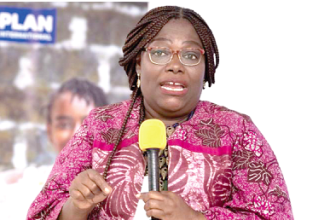The Government of Ghana says it is pursuing a bold “Extractives Sector Reset Agenda” to transform natural resource management for transparency, sustainability, and equitable national benefit.
Delivering the keynote address at the launch of the Africa Extractives Media Fellowship (AEMF) in Accra, Deputy Chief of Staff in-charge of Administration, Nana Oye Bampoe Addo said the agenda aligns with Ghana’s renewed commitment to responsible resource governance, a core pillar of President John Dramani Mahama’s economic reform drive.
She noted that extractives remain the backbone of African economies, contributing up to 30 percent of GDP and 70 percent of export earnings between 2000 and 2010, according to the African Development Bank.
Ghana’s extractives sector alone accounts for over 11 percent of GDP and 15 percent of government revenue. However, “Africa loses more than $40 billion annually to illicit financial flows from the extractives industry,” undermining investment in health, education, and climate resilience.
Reset Agenda for Accountability and Sustainability
The Deputy Chief of Staff disclosed that, since January 2025, government has rolled out major reforms under the Reset Agenda.
These includes;
- Establishment of the Ghana Gold Board (GOLDBOD) to regulate gold trading and combat smuggling.
- Creation of the National Anti-Illegal Mining Operations Secretariat (NAIMOS) to coordinate nationwide enforcement.
- Launch of the Responsible Cooperative Mining and Skills Development Programme (rCOMSDEP) to train miners, restore degraded lands, and create jobs for women and youth.
- Deployment of Blue Water Guards to protect major rivers from pollution.
- Implementation of the ‘Tree for Life’ project, which has planted over 7.6 million trees nationwide.
“These reforms show that Ghana’s natural resources must serve the people, not a privileged few,” Nana Oye said, pledging continued focus on protection, restoration, and value addition.
Media as Guardians of Resource Governance
Madam Oye Bampoe emphasized the media’s pivotal role in ensuring accountability in the extractives sector, describing journalists as “vanguards and guardians of resource governance.”
“To the selected Fellows, you are not just journalists; you are guardians of resource governance,” she said. “Every dataset you interrogate and every concession agreement you expose contribute to national accountability.”
She called for a renewed partnership between the state and the media, built on transparency and mutual responsibility. “As a government committed to openness, we welcome scrutiny, not as confrontation, but as collaboration,” she added.
Fellowship to Empower African Journalists
The Africa Extractives Media Fellowship, initiated by Newswire Africa with support from the Australian High Commission and other partners, seeks to equip journalists across the continent with tools for evidence-based reporting on mining, oil, gas, and environmental governance.
By fostering collaboration between journalists, academia, and civil society, the fellowship aims to promote informed, data-driven reporting that strengthens public oversight and policy reform.
Ghana’s Reset Agenda, coupled with initiatives like AEMF, signals a new chapter in Africa’s collective effort to ensure that its natural wealth drives sustainable development and benefits all citizens.
By: Christian Kpesese/ www.naturalresourcesnews.com



